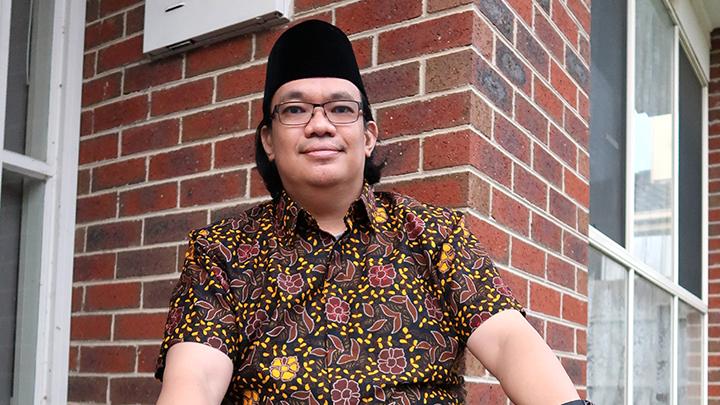NU Young Intellectual: Don't Use Clerics as Mere 'Fire Fighters'
Translator
Editor
29 May 2020 11:05 WIB

TEMPO.CO, Jakarta - Nadirsyah Hosen observes that the Indonesian public has been split into two major groups as the country grapples with the Covid-19 pandemic.
ACCORDING to this young intellectual of Nahdlatul Ulama (NU), the first group feels that the coronavirus scare is unnecessary as people only need to fear God. In their eyes, the prohibition to conduct religious rituals in places of worship is unwarranted.
The second group, however, prioritizes humanitarian aspects in practicing their faith. For them, God wants humans to be safe, comfortable and healthy to practice faith, therefore, they do not resist regulations such as the prohibition of mass prayers in mosques. “This phenomenon can be seen among the followers of all faiths around the world,” Nadirsyah said during the special interview with Tempo on May 6.
Nadirsyah, 46, said that the Covid-19 pandemic had shone a light on how immensely the government’s decisiveness, or the lack of it, influenced the people’s behaviors. In the country where he lives, Australia, the government strictly enforces rules in every sector. “Mosques, churches, temples, malls, casinos, bars, clubs to brothels must be shut down and the regulation is enforced in all corners of the country so it’s fair,” explained the head of the consultative board of Nahdlatul Ulama’s special branch for Australia and New Zealand.
Gus Nadir who came from a strong Islamic educational background is active in the Western academic world. He is in fact the first Indonesian to hold a permanent lecturer position at the law faculty of the Monash University where he teaches the general law and Islamic jurisprudence (fiqh). He uses social media as a platform to give sermons and promote peaceful Islam and pluralistic values among the younger generation. His opposing views towards the caliphate have often earned him labels such as liberal, secular, or even misguided.
From his Melbourne home, Nadirsyah talked with Tempo via a teleconference. During the conversation that went for over two hours, he spoke about the importance of the role of religious leaders in facing the pandemic, the tug-of-war over mudik (return to hometowns) to the challenges in serving the faithful in the era of social media.
You said the public had been split into two in responding to the pandemic. Is this phenomenon already worrying because a lot of people are adamant about mass prayers?
To be fair, these two perceptions are present in every Islamic group or mass organization. For instance, there are divisions among the Jamaah Tabligh followers. Some leaders issued fatwa (edicts) to disallow activities in mosques, while others allow them. That also goes for NU. Some kyai (clerics) in the regions continue to carry out congregational prayers in mosques. If we want to be fair, we certainly should not point finger at one particular group or faith.
What should religious leaders do about that?
This corona pandemic is a health issue. With due respect to all the priests, pastors, monks, kyais and clerics, I say they should know their limits. With their deep understanding of holy books, they sure have the authority in the religious domain. But when it comes to health issues, they should be more rational and accept the advice and suggestions of doctors. Our concern is egoistic attitudes in practicing faith believing that the most important thing is to worship or to get into heaven and that’s all that matters. If other people get affected (from their acts), well, that’s their business with God. Meanwhile, the second group believes that their faith teaches them not to inflict harm upon themselves, not to mention others.
From the fiqh point of view, how should the believers respond to the government’s advice and prohibitions?
Not just the government, many ulama (Muslim scholars) have also issued fatwas. But, again, worship is a very personal act. There are groups who consider worship as the relation with God which should not be interfered by the government or anybody else although the religion itself allows room for flexibility. For example, Islam allows the Friday prayer at the mosque to be substituted with zhur (noon prayer) for valid considerations. Congregational prayers can also be done at home with families that give the same reward. Then about the one-meter distancing for shaf (gap), for example. If they can be flexible with this distancing rule although the congregation is required to stand very close to each other, why can’t they be flexible to pray at home? The government cannot violate personal rights and prohibit worship. It has only banned gathering, not praying.
Are there any principles in Islamic law that are relevant to the current conditions?
There is a doctrine called maqasid shariah, the objectives of Islamic law. There are five objectives, namely, to preserve religion, life, property, lineage and intellect. Ulamas all agree on this but some question the order of importance. Some say that the first is religion. If the other four oppose religion, religion must prevail over the others. Some others, meanwhile, believe that the most important objective is life. So, if religious rules pose threat to self-preservation, then self-preservation must come first.
How are they implemented?
If doctors say you should not fast for medical reasons, Islam allows you to be exempted from fasting. This shows that the self-preservation principle takes precedence over preserving the faith. Islam allows room for humans to take care of themselves. So, there emerged from ulema an axiom "sihhatul abdan muqoddimatun 'ala shihhatil adyan" or simply put, human health over religion health. It means we should make ourselves healthy first to be able to worship.
Muslims are a minority in Australia. How do they behave amid the pandemic?
In the same way. The phenomenon of the two attitudes above exists in all faiths and in all countries. The difference is the decisiveness of the governments.
Read the full interview in Tempo English Magazine























